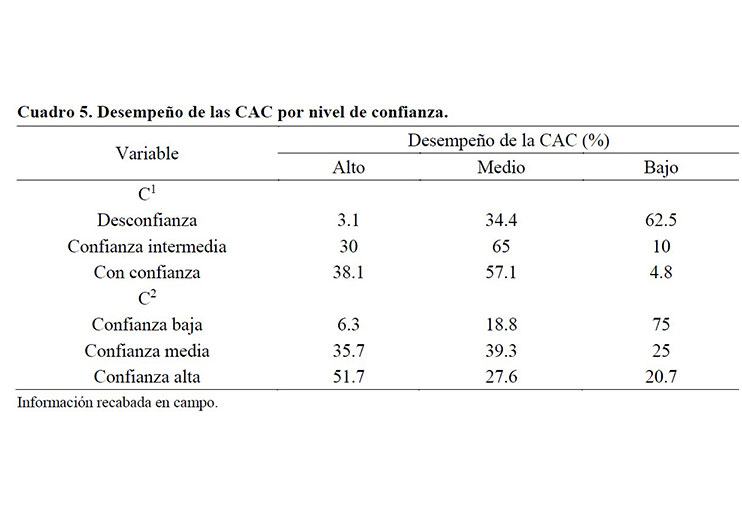Social capital and public policies for rural development. Analysis of the sowing life program
DOI:
https://doi.org/10.29312/remexca.v14i3.3119Keywords:
peasant learning communities, Probit model, trustAbstract
The objective of this research was to know the elements that determine the social capital in the beneficiaries of the Sowing Life Program, based on quantitative and qualitative information obtained from the beneficiaries. Two trust measures were used, with which three levels of trust were built: low, medium and high, and the proposed equations were estimated using a Probit model. The estimated models allow concluding that those beneficiaries surveyed who are older, inhabitants of rural populations and who voluntarily participate in local groups or organizations, have a greater probability of belonging to the groups of greater trust. Using the trust measure based on the perception of reliability of the people from the locality, the results of the model indicate that gender and ethnicity status have a negative and positive effect on trust level, respectively. While the model based on the rating given to different local actors suggests that these two characteristics have a negative effect on the level of trust. On the other hand, it was observed that, at higher levels of trust of the beneficiaries, their organizational performance through peasant learning communities increases.
Downloads
References
Bourdieu, P. F. 2007. El capital social. Notas provisorias. En campo del poder y reproducción social. Elementos para un análisis de la dinámica de las clases. Córdoba: Ferreyra Ed. 203-206. pp.
CONEVAL. 2020. Evaluación de diseño con trabajo de campo del programa sembrando vida. 81 p. https://www.gob.mx/cms/uploads/attachment/file/565806/Informe-Final-Dise-o-Sembr ando-Vida.pdf.
Custodio, G. C. A. y Martínez, B. A. E. 2018. El capital social en el estudio de la dinámica social y productiva de los espacios rurales en México. Agenda pública para el desarrollo regional, la metropolización y la sostenibilidad. 3(2):692-703.
Knack, S. and Zak, P. J. 2003. Zak building trust: public policy, interpersonal trust, and economic development. Supreme Court economic review. The University of Chicago Press. 28(2):91-107 pp. https://doi.org/10.1086/scer.10.1147139. DOI: https://doi.org/10.1086/scer.10.1147139
Leiras, M. 2007. La incidencia de las organizaciones de la sociedad civil en las políticas públicas. Definiciones, explicaciones y evaluación de la literatura especializada local e internacional. La incidencia política de la sociedad civil. Siglo XXI. 17-66 pp.
Morgan, D. L. 1998. Practical strategies for combining qualitative and quantitative methods: applications to health research. Qualitative Health Research. 8(3):362-374 pp. https://doi.org/10.1177/104973239800800307. DOI: https://doi.org/10.1177/104973239800800307
Nikolakis, W. and Nelson, H. 2018. Trust, institutions, and indigenous self-governance: an exploratory study. Governance. 32(1):331-347. https://doi.org/10.1111/gove.12374.
Ostrom, E. y Ahn, T. K. 2003. Una perspectiva del capital social desde las ciencias sociales: capital social y acción colectiva. Instituto de Investigaciones Sociales. Rev. Mex. Sociol. 65(1):168-173. DOI: https://doi.org/10.2307/3541518
Putnam, R. D. 1993. Making democracy work. Princeton University Press. New Jersey. 99-102 pp.
Secretaría de Bienestar. 2020. Acuerdo por el que se emiten las reglas de operación del programa sembrando vida, para el ejercicio fiscal. Diario Oficial de la Federación. 2-10 pp.
Yin, R. K. 1989. Case study research: design and methods, applied social research methods series. Newbury Park CA, Sage. 162-164 pp.

Published
How to Cite
Issue
Section
License
Copyright (c) 2023 Revista Mexicana de Ciencias Agrícolas

This work is licensed under a Creative Commons Attribution-NonCommercial 4.0 International License.
The authors who publish in Revista Mexicana de Ciencias Agrícolas accept the following conditions:
In accordance with copyright laws, Revista Mexicana de Ciencias Agrícolas recognizes and respects the authors’ moral right and ownership of property rights which will be transferred to the journal for dissemination in open access. Invariably, all the authors have to sign a letter of transfer of property rights and of originality of the article to Instituto Nacional de Investigaciones Forestales, Agrícolas y Pecuarias (INIFAP) [National Institute of Forestry, Agricultural and Livestock Research]. The author(s) must pay a fee for the reception of articles before proceeding to editorial review.
All the texts published by Revista Mexicana de Ciencias Agrícolas —with no exception— are distributed under a Creative Commons License Attribution-NonCommercial 4.0 International (CC BY-NC 4.0), which allows third parties to use the publication as long as the work’s authorship and its first publication in this journal are mentioned.
The author(s) can enter into independent and additional contractual agreements for the nonexclusive distribution of the version of the article published in Revista Mexicana de Ciencias Agrícolas (for example include it into an institutional repository or publish it in a book) as long as it is clearly and explicitly indicated that the work was published for the first time in Revista Mexicana de Ciencias Agrícolas.
For all the above, the authors shall send the Letter-transfer of Property Rights for the first publication duly filled in and signed by the author(s). This form must be sent as a PDF file to: revista_atm@yahoo.com.mx; cienciasagricola@inifap.gob.mx; remexca2017@gmail.
This work is licensed under a Creative Commons Attribution-Noncommercial 4.0 International license.


